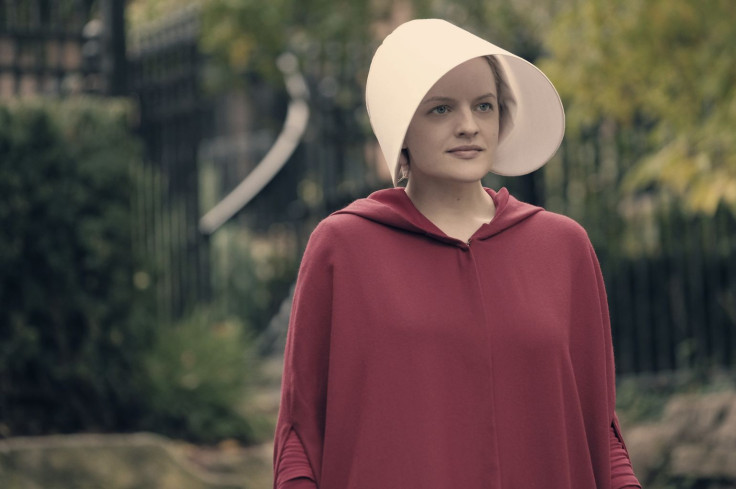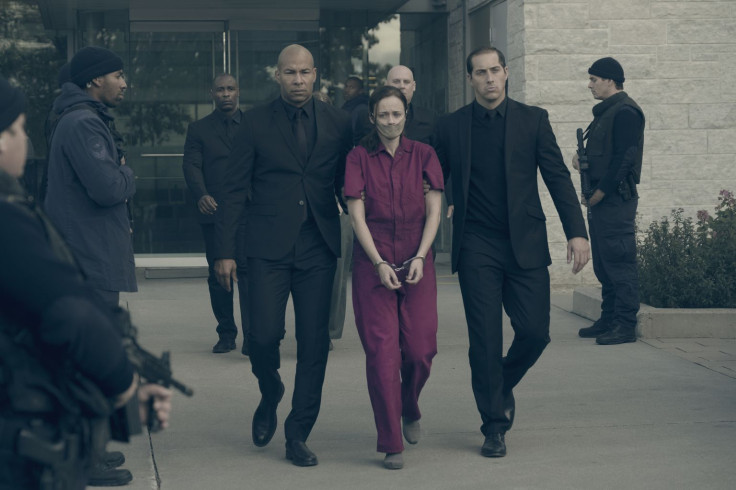‘The Handmaid’s Tale’ Review: Should You Watch Hulu’s Dystopian TV Show?

Considering libraries have waitlists for the book, it’s no surprise that Hulu’s adaptation of Margaret Atwood’s “The Handmaid’s Tale” is a highly anticipated TV show. Luckily, the dystopian drama lives up to expectations. It’s easily one of the best TV shows of 2017 so far.
“The Handmaid’s Tale” follows Offred (Elisabeth Moss), a sex slave who is forced to bare children. Offred was previously a pretty normal person with the exception of the fact that she was fertile, a rarity in this world. She had a job, husband, young daughter and an average life — until a new regime takes over.
A totalitarian religious government rules Gilead, the new name for the U.S. They’re fixing things. They are clearing the toxic waste that has overtaken parts of the country. They’re helping the population problem and giving babies to couples who desperately want them. But, as one character says very clearly in the pilot: “Better never means better for everyone.”
READ: How “The Handmaid’s Tale” TV Show Changes The Books
Women don’t have rights in this new world. Offred is taken away from her family and forced to be a handmaid (which is a nice name for sex slave who has to have children for barren upper class wives). She is determined to find her daughter, Hannah, but doing anything anti-government (like trying to escape from slavery) is dangerous.
“The Handmaid’s Tale” feels disturbingly real. Through flashbacks in the first three episodes, which Hulu made available to the press, we see exactly how Gilead came to be. No one noticed just how extreme and powerful this group was until it was too late. It’s frighteningly easy to believe.
What makes this dystopia more interesting, however, is the characters within “The Handmaid’s Tale.” Though the show is largely about female oppression, it’s not always the male characters that are hurting Offred. Often it’s women who seem most directly harmful. Aunt Lydia (Ann Down), the vicious den mother of the handmaids, forces the women to accept their fate, and she’s quick to use force if they don’t. Serena Joy (Yvonne Strahovski), the barren commander’s wife Offred works for, makes it clear that she does not plan on making life comfortable for her handmaid until she’s pregnant.
Offred can’t just trust any woman she meets. She starts the pilot disgusted with Ofglen (Alexis Bledel), who she thinks is a hardcore believer. She’s shocked to learn that Ofglen is actually a lesbian and also just playing her part in this new society.
It’s those kind of trust issues that make the relationships so interesting. Offred doesn’t know where she stands with anybody in this world. Why does her commander Fred (Joseph Fiennes) want to spend time with her outside of the bedroom? Why does Serena Joy (Yvonne Strahovski) keep a handmaid in the house when she clearly can’t handle being reminded of her own barrenness? Should she heed Nick’s (Max Minghella) warning about keeping her head down? Though the political nature and feminist themes are a huge part of the show, it’s the complex relationships that really make “The Handmaid’s Tale” must-see TV.
It helps that the show is amazingly well cast. Moss is a shoo-in for an Emmy nomination in a year that’s already packed with great performances. Both Moss and Samira Wiley, who plays Moira, manage to convey their frustration and anger without many words at all when they’re in Gilead. Alexis Bledel finally sheds her image as Rory Gilmore and proves her talent as Ofglen, particularly in episode 3. Strahovski plays the commander’s wife beautifully as well, torn between wanting a family and being jealous of her servant.
Though the pilot is enough to hook viewers, Hulu is releasing the first three episodes of the series at once before switching to their weekly format. The first three installments of “The Handmaid’s Tale” premiere Wednesday, April 26.

© Copyright IBTimes 2024. All rights reserved.





















